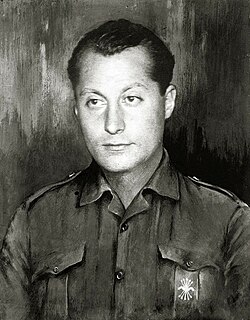José Antonio Primo de Rivera
|
José Antonio Primo de Rivera GE |
|
|---|---|

Primo de Rivera in 1934
|
|
| President of the Falange | |
|
In office October 29, 1933 – November 20, 1936 |
|
| Leader | Himself |
| Succeeded by | Ramón Serrano Súñer |
| Member of the Congress of Deputies | |
|
In office 30 November 1933 – 7 January 1936 |
|
| Constituency | Cádiz |
| Personal details | |
| Born |
José Antonio Primo de Rivera y Sáenz de Heredia April 24, 1903 Madrid, Spain |
| Died | November 20, 1936 (aged 33) Alicante, Spain |
| Resting place | Valley of the Fallen (1959-) |
| Nationality | Spanish |
| Political party |
Unión Patriótica (1923–1930) Spanish Renew(1930–1933) Falange (1933–1936) |
| Relations | Miguel Primo de Rivera (father) |
| Profession | Lawyer |
| Religion | Roman Catholicism |
José Antonio Primo de Rivera y Sáenz de Heredia, 1st Duke of Primo de Rivera, 3rd Marquis of Estella, GE (April 24, 1903 – November 20, 1936) was a Spanish lawyer, nobleman, politician, and founder of the Falange Española ("Spanish Phalanx"). He was executed by the Spanish republican government during the course of the Spanish Civil War.
José Antonio Primo de Rivera was born in Madrid on April 24, 1903, the oldest son of General Miguel Primo de Rivera, Prime Minister and Dictator under the monarchy of King Alfonso XIII of Spain. From his father he inherited the title of Marquis of Estella (in Navarre). He never married.
His mother died when he was five years old, and he was subsequently raised by his father's sister. He was privately taught at home, and learned English and French. When at university, he did not attend lectures until the second year of his undergraduate studies. He spent his summer holidays in the country estate of an uncle where he practiced horse riding and hunting.
Primo de Rivera went on to study law at the University of Madrid between 1917 and 1923. He helped to organize the student union there, "Federación Universitaria Escolar," which opposed the higher-education policies of his father. He took undergraduate and graduate courses simultaneously and he obtained both his Bachelor and Doctor degrees in the same year, 1923.
After graduating he picked the "One-Year Volunteer" option to do his military service while his father was dictator. He served with the Ninth Dragoons of St. James cavalry regiment stationed at Barcelona. He was court-martialed for punching a superior officer, Brigadier General Gonzalo Queipo de Llano.
Queipo de Llano had written a defamatory letter against an uncle of José Antonio and against the Dictator himself. José Antonio, ready to defend the honour of his family abused by the Republican general, went to the café where the latter used to socialize, and after asking whether he was the author of the writing, and after receiving the general's affirmative reply, delivered a spectacular punch that made the general roll on the floor, sparking a free-for-all between the companions of José Antonio and the companions of the general.
...
Wikipedia
